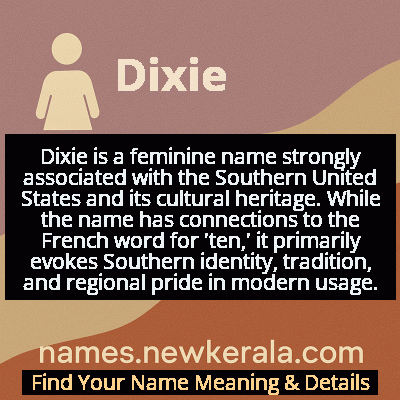Dixie Name Meaning & Details
Origin, Popularity, Numerology Analysis & Name Meaning of Dixie
Discover the origin, meaning, and cultural significance of the name DIXIE. Delve into its historical roots and explore the lasting impact it has had on communities and traditions.
Name
Dixie
Gender
Female
Origin
Christian
Lucky Number
6
Meaning of the Name - Dixie
Dixie is a feminine name strongly associated with the Southern United States and its cultural heritage. While the name has connections to the French word for 'ten,' it primarily evokes Southern identity, tradition, and regional pride in modern usage.
Dixie - Complete Numerology Analysis
Your Numerology Number
Based on Pythagorean Numerology System
Ruling Planet
Venus
Positive Nature
Harmonious, responsible, caring, and artistic.
Negative Traits
Overly idealistic, superficial, possessive, or jealous.
Lucky Colours
Pink, turquoise.
Lucky Days
Friday.
Lucky Stones
Diamond, turquoise.
Harmony Numbers
2, 3, 9.
Best Suited Professions
Artists, musicians, teachers, healthcare workers.
What People Like About You
Warmth, nurturing nature, artistic flair.
Famous People Named Dixie
Dixie Carter
Actress
Starred as Julia Sugarbaker on 'Designing Women' and received Tony Award nominations
Dixie Chicks
Musical Group
Won multiple Grammy Awards and revolutionized country music in the 1990s-2000s
Dixie Dean
Soccer Player
Set the English football record for most goals in a single season (60 goals)
Dixie Lee
Actress and Singer
Successful Hollywood career in the 1930s and marriage to Bing Crosby
Name Variations & International Equivalents
Click on blue names to explore their detailed meanings. Gray names with will be available soon.
Cultural & Historical Significance
The name's cultural journey reflects America's ongoing reckoning with its past, serving as both a cherished regional identifier and a reminder of difficult historical truths. While some continue to embrace Dixie as a celebration of Southern heritage, others view it through the lens of racial injustice and systemic oppression. This duality makes the name a fascinating case study in how cultural symbols evolve and how societies navigate the complex relationship between tradition, identity, and historical accountability in the modern era.
Extended Personality Analysis
Women named Dixie are typically characterized by their warm, welcoming nature and strong connection to tradition and family values. They often possess what is commonly described as 'Southern charm'—a combination of politeness, hospitality, and social grace that makes others feel immediately comfortable. These individuals tend to be deeply rooted in their communities and maintain strong ties to their heritage, often serving as keepers of family stories and traditions. Their personality reflects a blend of resilience and gentility, able to handle challenges with grace while maintaining their characteristic warmth and optimism.
Beyond their traditional values, Dixies often exhibit creative and expressive qualities, with many showing talent in music, storytelling, or other artistic pursuits. They tend to be loyal friends and devoted family members who prioritize relationships above all else. Their strength of character is balanced by a playful, sometimes mischievous sense of humor, and they often become the heart of their social circles. While proud of their roots, modern Dixies typically demonstrate adaptability, blending traditional values with contemporary perspectives in a way that feels authentic and grounded.
Modern Usage & Popularity
In contemporary naming practices, Dixie has seen a significant decline in popularity due to growing awareness of its complex historical associations. While the name maintained moderate usage through the mid-20th century, particularly in Southern states, it has become increasingly rare in recent decades. Current usage is largely confined to families with strong Southern heritage who view the name as an important cultural identifier, though even in these contexts, many are opting for alternative Southern-inspired names. The name's modern perception is deeply polarized—celebrated by some as a symbol of regional pride and criticized by others as a reminder of America's history of slavery and racial injustice. This cultural reckoning has led to the name falling out of favor in most regions, with birth registries showing minimal usage in the 21st century compared to its peak popularity periods.
Symbolic & Spiritual Meanings
Symbolically, Dixie represents the complex tapestry of Southern American identity, embodying both the romanticized ideal of Southern hospitality and the difficult realities of historical injustice. The name serves as a metaphor for regional pride and cultural continuity, symbolizing the enduring nature of traditions and community bonds across generations. It evokes images of resilience in the face of adversity, reflecting how Southern culture has persisted and evolved through profound social and economic changes. The name also symbolizes the ongoing American conversation about history and memory—how societies preserve cultural heritage while acknowledging painful historical truths. As a symbol, Dixie continues to represent the tension between celebration and critique, tradition and progress, making it a powerful emblem of America's ongoing journey toward understanding its complex past.

